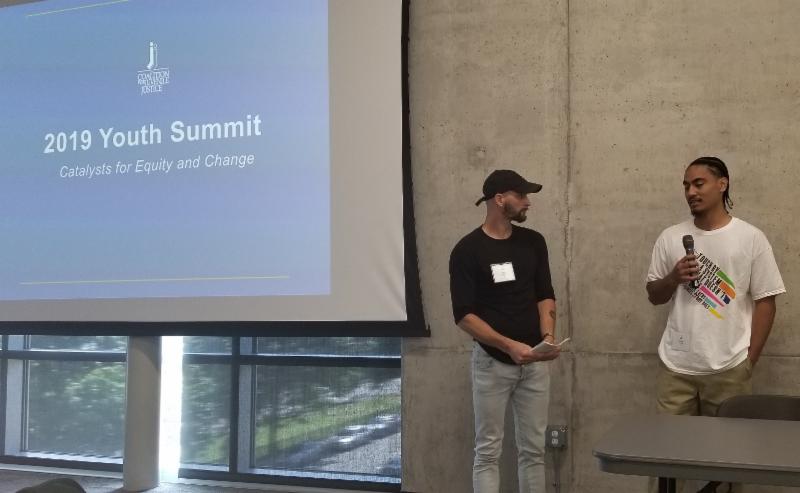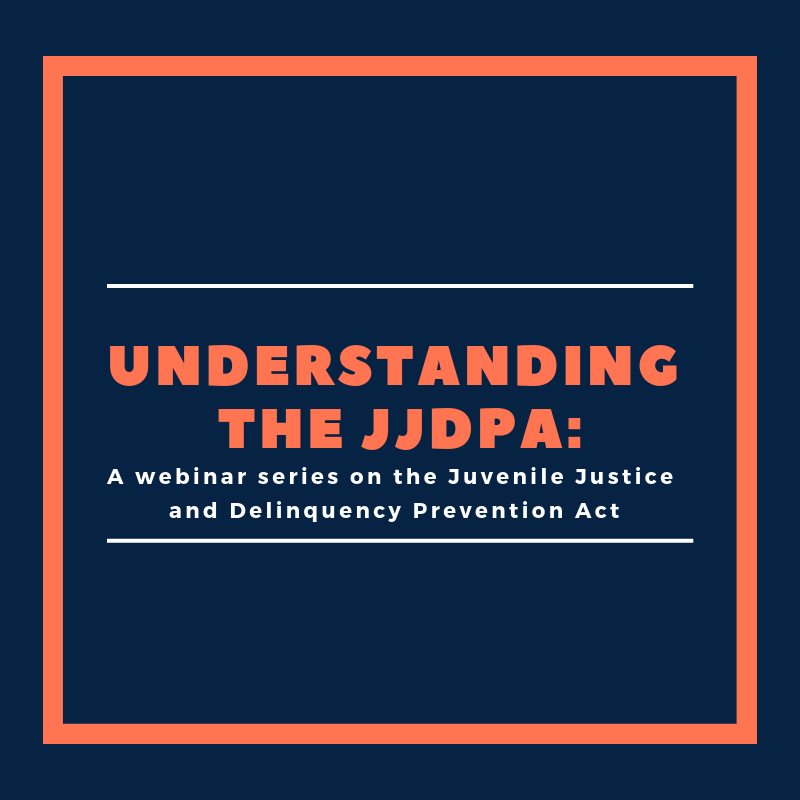CJJ's
2019 Racial and Ethnic Disparities Conference
"A Time for Action: Combating Racial and Ethnic Disparities through Inclusion, Equity, and Respect" will take place November 20-21 at the
Scottsdale Plaza Resort
in Scottsdale, Az.
CJJ's Racial and Ethnic Disparities Conference brings together juvenile justice practitioners and advocates from across the country to share promising practices, findings, and strategize about ways to eliminate the racial and ethnic disparities that exist within our youth serving systems.
Interested in joining us in Scottsdale for this year's Racial and Ethnic Disparities Conference?
The conference will explore the following:
- How are communities taking action to address and end racial and ethnic disparities?
- How do we shift our focus and work from Disproportionate Minority Contact to Racial and Ethnic Disparities?
- What role does data collection play in eliminating racial and ethnic disparities, and how can collection be improved?
- What changes can be made at the system's front end to reduce racial and ethnic disparities?
- How can youth advocates, law enforcement, attorneys, the judiciary, and community leaders work together to combat the crisis?
Registration for this event is available
here.
Stay tuned for a draft agenda!
For questions, please contact Laura Armstrong at
[email protected].
Aug 11- Sept 15
$325/Member
$455/Non-Member
$200/Student
|
Late Registration
Sept 16 - Nov 1
$355/Member
$485/Non-Member
$205/Student
|
|
|

This year's Youth Summit, "Catalysts for Equity and Change
", took place July 31-Aug. 1, in Tacoma, Wa. The event brought together young leaders and advocates from across the country for a live and web-based training.
CJJ Emerging Leaders Committee (ELC) members Aaron Toleafoa, Guillermo Padillas, Garrett Comer, and Joseph Huntley led several
workshops
to educate
participants
about the juvenile justice system from the perspective of those who are currently system involved. CJJ ELC member Evan Quaintance led a workshop on the intersection of juvenile justice and mental health and addressed the barriers to mental health treatment that many system-involved youth face. Keynote speaker Noah Schultz shared about the importance of lifting up the voices of those who are directly impacted by the juvenile justice system and mass incarceration.
The event was hosted at the University of Tacoma Washington in Tacoma, Wa., and shared via webcast with those who could not join in person.
A photo recap of the 2019 Youth Summit is available here.
|

Today, August 15 at 3:00 p.m. Eastern
Youth who come in contact with the juvenile justice system can experience numerous barriers when transitioning back into their communities, including obtaining employment, securing stable, safe, and affordable housing, and transferring school credits.
The 2018 reauthorization of the JJDPA sets out, for the first time, language related to reentry plans for youth who are returning to the community. This is a critically important step to ensure that young people exit the justice system to safe, stable, and secure housing. Research has shown that 44% of young people who are experiencing homelessness report that they have also spent time in a jail or detention facility.
This webinar will discuss language in the the new JJDPA regarding reentry, how states can work with youth, families, schools, businesses, and community-based organizations when planning for reentry, and provide examples of successful programs.
Presenters:
Andrew Palomo, Director of Community Strategies, National Network for Youth
Lisa Pilnik, Senior Advisor, Coalition for Juvenile Justice
Ruth Rovezzi, Deputy Commissioner for Operations, Department of Youth Services, Massachusetts
October 23 at 3:00 p.m. Eastern
Large numbers of youth are pushed out of schools and into the justice system fueling inequalities based on race, gender, perceived sexual orientation, and disability. Additionally, system-involved youth do not have the same access to quality education as their non-incarcerated peers.
The 2018 reauthorization of the JJDPA includes important new protections for youth in the juvenile justice system to support their reentry to school, including timely transfers of education records, partial or full credit for coursework completed while in custody, and ensuring those credits count towards high school graduation.
This webinar will discuss the new JJDPA's educational requirements, information on the school-to-prison-pipeline, and examples of states that have successful and evidence-based educational reentry programs.
This webinar is free to CJJ members. To become a member, click here.
|
CJJ is looking for bloggers for
CJJ Today to author stories and posts about juvenile justice. We're particularly interested in stories from
State Advisory Group members or staff, CJJ
individual or
youth members, and CJJ
organizational members, about issues at the state or local level, interesting programs or approaches, and perspectives about the course of juvenile justice reform at the local or state level. We also welcome blog posts from other juvenile justice system stakeholders. Blog posts can be between 400-750 words in length. Click
here to see our other guidelines for blogs.
Suggested topics could include:
- School to Prison Pipeline
- Girls in the Juvenile Justice System
- Remedying Racial and Ethnic Disparities
- Adolescent Brain Development
- Evidence-Based Practices
- Status Offenses
- Family and Youth Involvement
- Promising Practices or Program Spotlights
If interested please email [email protected] for more details.
|
Missouri has made addressing Racial and Ethnic Disparities within their juvenile justice system a top priority.
The reauthorization of the Juvenile Justice and Delinquency Prevention Act (JJDPA) in December of 2018, resulted in updates to the Act's four core protections and sweeping system-wide changes for state and local juvenile justice agencies. One of the most significant changes to the Act is the shift from Disproportionate Minority Contact (DMC) to Racial and Ethnic Disparities (RED). In Missouri, State Advisory Group members and juvenile justice agencies are already taking steps to implement these new changes into their pre-existing methods of addressing and reducing racial and ethnic disparities in the juvenile justice system.
There are currently 8 active Racial and Ethnic Disparity sites in Missouri. Their work is overseen by a Steering Committee comprised of key juvenile justice stakeholders and advocates. Local racial and ethnic disparity coordinators from each site meet also have the opportunity to meet quarterly to discuss individual progress and barriers, and strategize best practices for addressing racial and ethnic disparities across jurisdictions.
State RED Coordinator Lora Hall facilitates monthly calls for local racial and ethnic disparity coordinators across Missouri that include educational programming and create a space for coordinators to discuss barriers to racial equity in their own jurisdictions and receive feedback and support from other coordinators. This work to improve inter-agency communication allows for more efficient information sharing among racial and ethnic disparity coordinators and other youth-serving professionals across the state and ensures that racial equity remains at the forefront of the minds of those working create more equitable outcomes for youth and families.
|
Trauma-Informed Schools Act of 2019
On July 26, 2019, Vice Chair of the House Democratic Caucus Congresswoman Katherine Clark (D-MA), Congressman Mike Quigley (D-IL) and Congressman Brian Fitzpatrick (R-PA) introduced The Trauma-Informed Schools Act of 2019. This bipartisan bill is the first to define "trauma-informed practices" in federal education code, and aims to provide educators with the training, resources, and support needed to administer trauma-informed care to all students.
The Trauma-Informed Schools Act
of 2019 designates federal funding for professional development opportunities, charter schools, and after school programs that utilize trauma-informed care to ensure that educators are able to identify and recognize how trauma can impact a student's ability learn, grow, and thrive in the classroom and beyond.
"Providing a greater availability of training and resources to assist our teachers and principals is critical to understanding the impact of traumatic experiences on students' ability to learn in the classroom,"
said Congressman Quigley in the official press release for the Act.
|
|
Events and Trainings
- The Child Welfare League of America will hold their 2020 conference "Sharing Ideas that Strengthen Families and Engage Communities to Promote Child Well-Being", March 25-29, 2020, at the Hyatt Regency Capitol Hill in Washington DC.
- The 2019 International Criminology Conference will take place Oct. 31 at the Historic Quaker Meetinghouse in Washington DC. This event is sponsored by the Policy Studies Organization, the International Journal on Criminology, and the American Public University.
New Publications and Resources
- The Sentencing Project released a fact sheet on the increase of women and girls who experience system involvement, and the disproportionate rates at which women and girls of color face incarceration in comparison to their white peers.
- The Georgetown Center for Juvenile Justice Reform published a report detailing their partnership with the Harris County Youth Collective and the crucial work being done in Harris County in terms of meaningful youth engagement and collaboration.
- Human Impact Partners released an evaluation framework that aims to assess and prevent racial inequities as a part of their work on the Los Angeles County Youth Diversion and Development Initiative.
- The New Jersey Institute for Social Justice published a report that focuses on strengthening New Jersey's community-based system of care for youth and families.
|
|
The Juvenile Justice Monitor is brought to you by staff and volunteer leaders of the Coalition for Juvenile Justice, and supported by membership fees paid by CJJ's State Advisory Group Members, Members at Large, Organizational Members, and allies. We are grateful to all for their ongoing support.
Coalition for Juvenile Justice
1319 F Street NW, Suite 402
Washington, DC 20004
202-467-0864
|
|
|
|
|